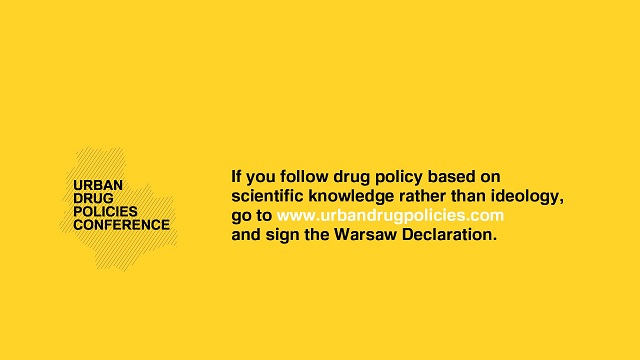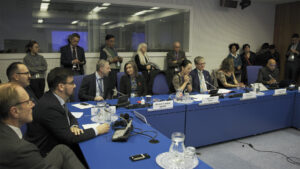Warsaw Declaration – the city of Warsaw is to implement a two-year program to reform city drug policy. The Polish Drug Policy Network will take further actions to encourage the EU to develop a common drug strategy for use at local level.
In Poland, as in other EU countries, it is in cities and urban settings that drug use is most concentrated and drug problems are most prevalent. Implementing evidence-based city-level policies which bring together multiple stakeholders is imperative for addressing drug-related challenges. The 2016 Urban Drug Policy Conference, organised in Warsaw by the Polish Drug Policy Network (PDPN), the National Office for Drug Prevention, and the City Hall of Warsaw, brought together many stakeholders from European cities, with the objective of sharing experience and best practice in urban drugs policies. Building on the 2010 Prague Declaration and new insights brought forth at the conference, it produced the Warsaw Declaration, as a key tool for implementing evidence-based drugs policies in European cities. The Declaration, which was promoted by the Polish government at the UN Commission on Narcotic Drugs and UNGASS 2016, comprises ten concrete and action-oriented recommendations, summarised as:
1. Policy responses should be coordinated, and decisions should be based on evidence and consultation with civil society.
2. Cities should allow innovation in drug policy.
3. Police should not target drug users, and should cooperate with health and social services.
4. The human rights of drug users should be protected.
5. A comprehensive menu of health and social services should be provided, including harm reduction.
6. Cities should create regulations and guidelines on safe nightlife and partying.
7. Local governments should allocate adequate and sustainable funding for services.
8. Local communities should be educated, and forums for dialogue to resolve confilcts should be created.
9. Local policies should be monitored and evaluated.
10. Partnerships and networking should be established among European cities.
The mere creation of a document, however, does not guarantee effective implementation. It’s made even more complicated by the fact that the ultra-right-wing party named Law and Justice has taken political power. That’s why all rights and civil liberties in Poland are being threatened – last week, the Polish Parliament voted to adopt legislation that exacerbates anti-abortion law. Thanks to the numerous and loud protests of women, the civil society movement managed to force the authorities to reject the draft amendment. It is not known when MPs intend to make Polish drug law more restrictive. Just as a reminder: in Poland, possession of any amount of drugs is punishable by up to three years’ imprisonment. Although there are also milder provisions available, they are not widely used. That’s why the strategy for implementing the Warsaw Declaration is directed at urban-level changes in Poland and all countries of the European Union. Experience in other European cities shows that changes at a local level lead to changes at state level. The city of Warsaw should play a special role in Polish drug policy – not just because Warsaw, like any other metropolis, is more affected by the drug problem than the rest of the country – but also because Warsaw, despite being the capital, can’t claim to have a progressive drug policy. Thanks to the conference and its main outcome – the Warsaw Declaration – the city of Warsaw is to implement a two-year program to reform city drug policy, based on the Warsaw Declaration postulates. Currently, a project to create an integrated help-centre for drug-addicted people is underway; like other European centres, it will focus on developing a hostel for the homeless, outreach centres, legal and social assistance, needle- and syringe-exchange programs, opioid substitution treatment, other types of therapy, and a consultative-diagnostic point where people can be freely and anonymously tested for HIV. The city of Warsaw is planning to create this facility by the end of 2018. Warsaw’s actions will be a good investment for the future, strengthening and broadening best practice, based on rational and effective urban drug policy. In addition, these activities may result in creating a model which could be implemented in other large Polish cities, as part of a national drug strategy.
In recent years, due to the financial crisis facing the whole of Europe, many cities have abandoned or at least significantly reduced funding for rational drug policy (harm reduction, prevention, education, cooperation with police). Often, the problem is not a lack of funds, but inappropriate distribution. The problem is also related to the lack of an appropriate city-level drug strategy. As a recent paper from the European Monitoring Centre of Drugs and Drug Addiction named “Drug policy and the city in Europe” concluded: in most EU countries, strategic planning at city level is difficult, because of the number of stakeholders and their diverse interests. Nonetheless, a trend exists towards the use of city-level drugs strategies, whether for drug use generally or to target specific issues. Despite overarching statements, cross-sector collaboration is hampered by a lack of structures to achieve stakeholder participation. This is further compounded by increasing pressure on funding for services and other responses, during a time of ongoing austerity in the European Union, while there is no evidence of a trend towards the allocation of dedicated budgets for city-level drugs strategies.
In this context, we are planning a strategy to prepare the EU for the next UN session, and encourage the EU to develop a common drug strategy for use by EU countries at local level. Civil society is disappointed by the final document adopted at UNGASS 2016, which failed to mention harm reduction, or to call for a ban on the death penalty for drug crimes, or for the decriminalisation of minor drug offences. Member states will meet again in 2019, when a new current Political Declaration and Plan of Action should be produced. That is why the Polish Drug Policy Network, together with European MEP Michał Boni, is planning two international actions – a public hearing in the European Parliament, which will take place in March 2017, and the Committee of Regions meeting in May 2017. The Committee of the Regions (CoR) is an EU advisory body composed of locally and regionally elected representatives from all 28 Member States. Through the CoR, they are able to share their views on EU legislation which directly impacts regions and cities. The planned events should prepare the EU for the global events which will take place in 2019. The EU Parliament hearing and the Committee of Regions meeting will provide opportunities to look at the problem of drug use in cities, and to create guidelines for implementing rational drug policy at a local level in Europe, leading to city policies based on best practice. The main recipients of the events are local authorities in Europe, politicians of the European Parliament and the European Committee, representatives of agencies carrying out drug policy/harm reduction programmes, and NGO representatives.
Agnieszka Sieniawska
Chairwoman of Polish Drug Policy Network





